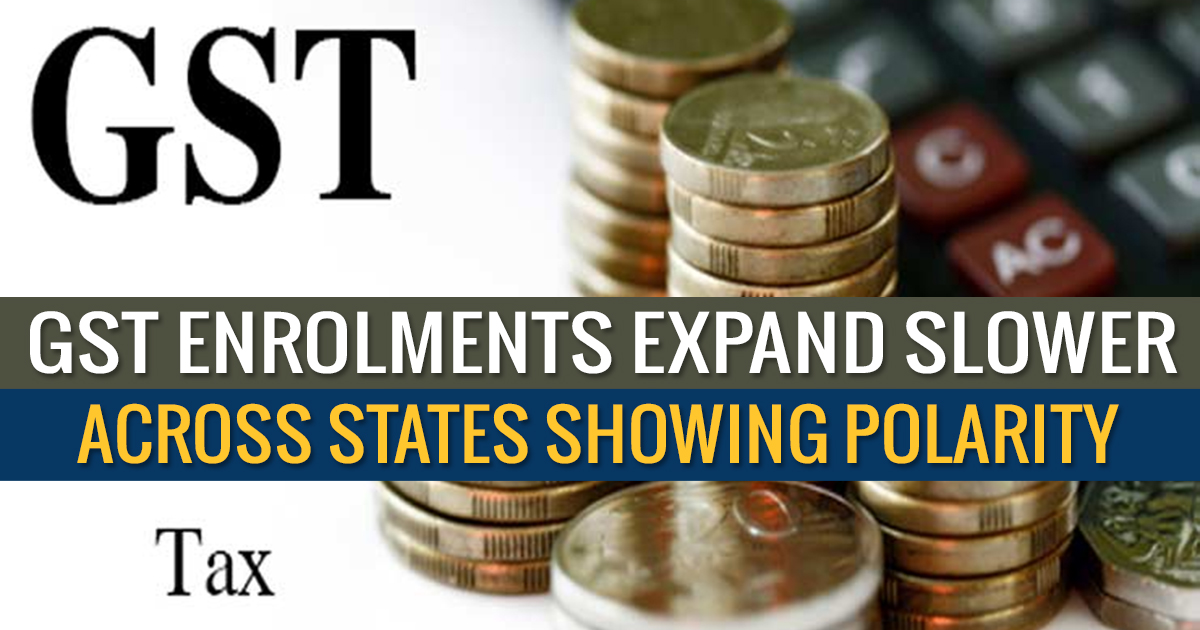The Indian constitution has been continuously striving towards the economy stability and as India draws nearer to the goods and services tax (GST) administration, the measurements on propelling enrollments issued by the administration draws an intriguing view of each state’s execution since the begin of the proper enrollment program in November 2016. Actualized in a staged way to stay away from overburden, the states started the procedure of impelling enrollments to guarantee a smooth move of more than 80 lakh taxpayers to the new roundabout tax structure, anticipated that would become effective on July 1. Be that as it may, if government figures are anything to pass by, the different states in the nation are indicating particular patterns in receiving the GST administration, with incongruities rising even at this beginning stage.
As there is no law mandating these enrollments, a few states are adopting a more handsome strategy to these propel enrollments, which are of two sorts: Shifting effectively enlisted elements (under VAT, excise, and service tax enlistments) and enlisting new applications. Different states, however, appear to take a more hold up and watch approach. In spite of a poor start, southern states have fared the best regarding advance enlistments, with Karnataka as of now accomplishing a 92.79 percent enrollment. Just Kerala has slacked with a 60.06 percent rate. Western and focal states have additionally fared well, aside from Goa, which is at 51.77 for percent.
Bipin Sapra, indirect tax partner, EY also mentioned some comments on this issue, “Some regions have been more pro-active in seeking GST enrollments as compared to others. As the data suggest, manufacturing states have done better as compared to seller (consumer) states.”
Rates of enrollment in the northern, eastern and northeastern districts of the nation are extensively lower. The northern condition of Jammu and Kashmir has fared the most exceedingly awful, with a negligible 0.55 percent enlistment rate. Indeed, even the National Capital Territory of Delhi has set up a normal execution of only 55.27 percent. Among the eastern and north-eastern states, West Bengal has fared the best with a 67.13 percent rate of enrollment, yet the locale has performed much more awful.
Sachin Menon, head, indirect tax, KPMG India said that “GST awareness is a critical factor resulting in disparities between enrollments in the various states. Historically, compliance in eastern and northeastern Dec 16, 2016 Nov 16, 2016, Jan 1, 2017, Apr 1, 2017, states has been lower, while western and southern states, with higher levels of computer literacy, have done better.”
Read Also: GST Network: Role of GST Suvidha Provider in India
As the laws identifying with the GST system are as yet being wrangled about, specialists say that numerous taxpayers are not feeling the criticalness to make the fundamental enlistments. Different complexities, for example, service tax enlistments, which are for the most part focal in nature, likewise should be dealt with by states. This procedure is awkward and tedious and bringing about a slack in the enrollment take-up. As per Sapra, as the date for changing over to the GST system is finished and there is more prominent clearness all the while and law, these enrollments ought to Percentage of taxpayers selected GST to control Nov 30, 2016 Nov 30, 2016 Nov 30, 2016 Aug 11, 2016 Nov 30, 2016 Nov 30, 2016 increment altogether. The production of these measurements, if nothing else, can bemuse just like marker of GST status and will doubtlessly boost states with lower rates of enrollments to take a more prominent activity at achieving larger amounts before the due date arrives.










